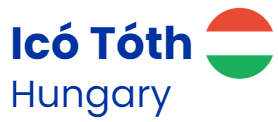Change Maker
When it comes to tackling cervical cancer – and the human papillomavirus that causes it – I think we’re making real progress in Hungary. The state provides free HPV vaccine in schools, and about 85 percent of young girls now agree to receive it. This will spare them the suffering that I went through.
I was diagnosed with cervical cancer in 2011. I remember hearing about the disease when I was younger. But the messaging was weak and inconsistent. No one really talked about it, and only a few girls received the vaccine.
Later, as a patient, I had to undergo surgery, radiation, and chemotherapy. Through it all, I felt so alone, like I was the only woman with this disease. I had lots of questions, but there were was no one I could ask; questions about the physical and psychological impact of the treatments, and about my feelings and fears. So, I began a diary. Every day I sat on the sofa and wrote and wrote. One year later, when I was healthy, we published my diary as a book, ‘Every Mom Recovers’.
I began visiting cities to introduce the book and was stunned that so many women would approach me to say that they too had had cervical cancer. Suddenly I realised that ’Oh, my God, I'm not alone. We need to do something. It's not okay for these patients, and former patients, to feel so isolated’. So, in 2013, we started the Mallow Flower Foundation to raise awareness about the disease and how to prevent it. We say that every woman is a mallow flower: beautiful, unwavering, and very brave. Just sometimes our petals can be hurt.
At the Mallow Foundation, we work hard. We try to reach not just the parents, but the children as well. Our strategy is to trigger honest discussions within each family. We say go home, sit down, and talk about HPV. Know what the virus is, and how you can prevent it. Getting the HPV vaccine has to be a shared decision. We give you all the information and you decide. And I think it is very important not to try and push people too hard.
We have specific programmes for teens as well and for adults. What’s new is an understanding of HPV in men and the risk it poses for anal, penile and throat cancers. The state began offering boys the vaccine in 2020, and already more than 60 percent of them are receiving the injections.
We have been relentless in our awareness campaigns. We go to fairs and setup large colourful booths to attract attention, and we are on social media. With teens, we use Instagram and comics. And it is important that the teens created the comics, with their own avatar characters, so that they’re actually in these comics. It is empowering. For the parents, we use Facebook, and we feature live video interviews with medical and scientific professionals to enhance our credibility – and always with a focus on prevention.
We organised the country’s first Cervical Cancer Prevention Week in 2014, and it is now showcased each January in Hungary. Every September, we send out a vaccine information package to 2,800 schools in Hungary to help spread the word. We established a website to present relevant statistics and some of the personal survivor stories; we organise lectures at universities; and emails, lots and lots of emails. We are communicating all the time.
Today we have 20 foundation chapters around the country. This has been very effective because they're closer to their communities. They know the schools and the local leaders in each. They know best what messages will resonate with their neighbours. It always means much more if those messages come from somebody nearby, as opposed to an organisation far away.
There is no question that eliminating cervical cancer remains the foundation’s top priority. In Hungary, we currently have about 1,200 new cases every year which result in at least 400 deaths. These mortality rates are unacceptable, but with so many young girls now receiving the vaccine, we will soon see these numbers drop significantly. In Hungary, we have plenty of reason for optimism.
To find out more about our HPV Action Network, its history, its co-chairs Prof. Daniel Kelly OBE and Margaret Stanley, Immediate Past-President, International Papillomarvirus Society (IPVS), click here. We also thank our past co-chair Rui Medeiros, President, European Cancer Leagues (ECL).
Also, don't hesitate to check out our HPV Testimonies project here.


